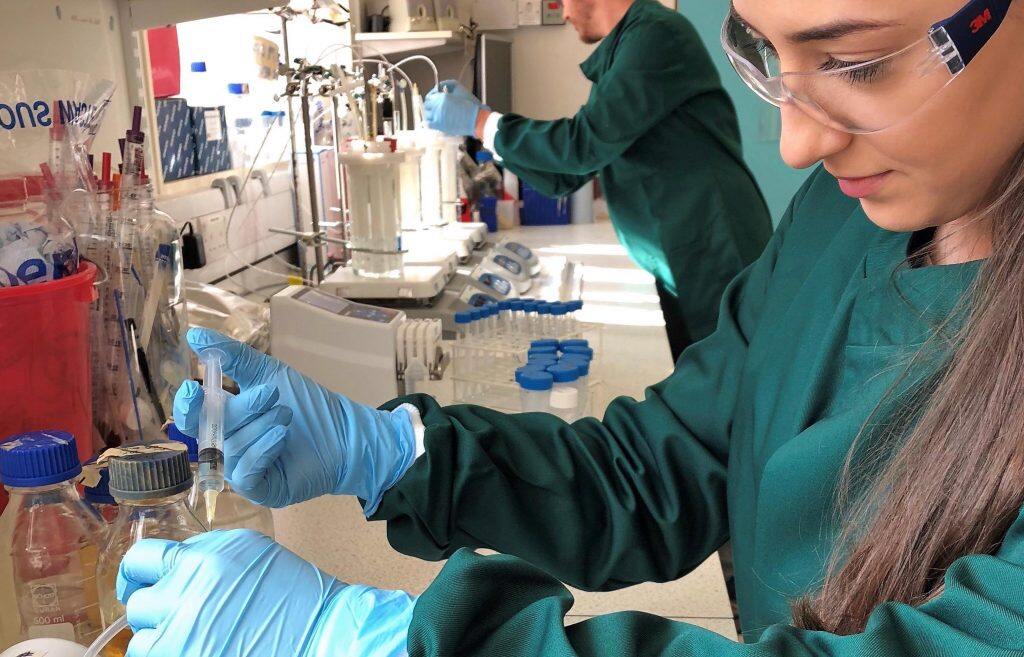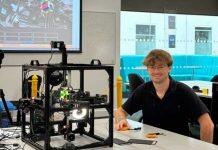The National Biofilms Innovation Centre (NBIC), co-led by the University of Nottingham, has received funding as part of a £22.5m investment from the UK Government to address skill gaps in the UK bioscience industry.


The Collaborative Training Partnerships (CTP), scheme run by the Biotechnology and Biological Sciences Research Council (BBSRC) will address these skill gaps through doctoral training led by businesses. The collaborative partnerships will work across the BBSRC’s strategic priorities areas such as Net Zero+, Tackling Infections, Transformative Technologies and more.
The NBIC is a led by four universities, Edinburgh, Liverpool, Nottingham and Southampton. The funding has been awarded to the Centre in partnership with portfolio medical technology business – Smith+Nephew and the NBIC Industry Advisory Board.


The Smith+Nephew and NBIC Consortium will focus on developing interdisciplinary scientists for small, medium and large companies, addressing biofilm challenges that have a £45bn impact in the UK.
NBIC Nottingham Co-Director, Professor Miguel Cámara, from the School of Life Sciences at the University of Nottingham, said: “The CTP will enable the NBIC industrial community to develop breakthrough technologies to address the economic impact of biofilms in collaboration with our academic partners whilst training the new generation of researchers in this area”.
NBIC CEO, Dr Mark Richardson said: “We are delighted to have been given the opportunity to award these studentships. Led by our Industrial Advisory Board, these will enable the development of interdisciplinary scientific talent for the biofilm sector in the UK. This will support our enduring mission of harnessing the UK’s academic and industrial strengths in biofilms through research, innovation and training”.
A total of 225 studentships have been awarded CTP funding, in partnership with academia and industry, spanning 29 businesses and 12 academic research organisations. The four-year studentships will be delivered over the period 2022-28 with £22.5m of funding from BBSRC, and more than £14m cash and in-kind co-investment from industry partners.
BBSRC Executive Chair, Professor Melanie Welham said: “With the awards we have announced today BBSRC underlines it commitment to work with industry to support the next generation of bioscience researchers. Projects will span areas vital to our strategic priorities, such as tackling infections and helping to meet our net zero goals”.
Story credits
About the National Biofilms Innovation Centre (NBIC)
The National Biofilms Innovation Centre (NBIC) is an Innovation Knowledge Centre (IKC) funded by the BBSRC, Innovate UK and the Hartree Centre and is led by four Universities (Edinburgh, Liverpool, Nottingham and Southampton), with a consortium of 63 academic partner institutions across the UK. It is the central hub where academia, industry, government, and public policy come together to tackle the grand challenges biofilms present, impacting ~$5 trillion in global economic activity, from food and health to ships, clean water and energy. NBIC’s mission is to establish a network of research and innovation capacity to catalyse partnerships with industry to achieve breakthrough innovations and impact. The centre also supports the development of technologies to prevent, detect, manage and engineer biofilms through translational Proof of Concept funding.
About Smith+Nephew
Smith+Nephew is a portfolio medical technology business that exists to restore people’s bodies and their self-belief by using technology to take the limits off living. Smith+Nephew call this purpose ‘Life Unlimited’. Their 18,000 employees deliver this mission every day, making a difference to patients’ lives through the excellence of our product portfolio, and the invention and application of new technologies across our three global franchises of Orthopaedics, Advanced Wound Management and Sports Medicine & ENT.
About the Biological Sciences Research Council (BBSRC)
The Biotechnology and Biological Sciences Research Council (BBSRC) invests in world-class bioscience research and training. This research is helping society to meet major challenges, including food security, green energy and healthier, longer lives and underpinning important UK economic sectors, such as farming, food, industrial biotechnology and pharmaceuticals.
About the Collaborative Training Partnership (CTP) Scheme
The BBSRC’s Collaborative Training Partnerships co-invest in training the next generation of skilled people for the research base and wider bioeconomy. Their vision is to provide PhD students with a first-rate, challenging research training experience within the context of a mutually beneficial research collaboration, between academic and partner organisations.






































